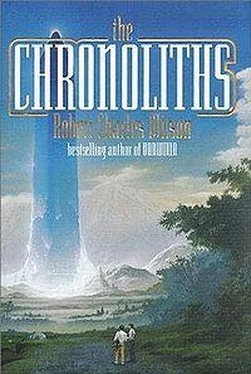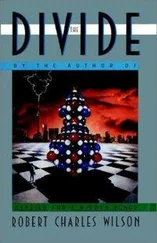The location of the arrival — identified by satellite surveillance and refined by on-the-spot measurement of ambient radiation — was as enigmatic and as unenlightening as so many other Chronolith sites.
Rural, small-town, or otherwise relatively undestructive Chronoliths were generally labeled “strategic,” whereas city-busters like the Bangkok or Jerusalem stones were “tactical.” Whether this was a meaningful distinction or just happenstance was subject to debate.
The Wyoming stone, however, clearly fell into the “strategic” category. Wyoming is essentially a high, barren mesa interrupted by mountains — “the land of high altitudes and low multitudes,” a twentieth-century governor had called it. Its oil reserves and its cattle business were hardly vulnerable to a Kuin stone, and in any case the projected arrival site featured neither of those resources — featured nothing at all, in fact, apart from a few crumbling farm structures and prairie-dog nests. The nearest town was a post-office village called Modesty Creek, fifteen miles up a two-lane tarmac road that ran through brown meadowland and basalt outcroppings and sparse stands of cottonwood. We traversed this secondary road at a cautious speed, and Sue took time off from her monologue to admire the waves of sage and wild nettles as we approached our destination.
What purpose, I asked her, could a Chronolith serve in a place like this?
“I don’t know,” she said, “but it’s a good and reasonable question to ask. It must mean something . It’s like playing a game of chess and suddenly your opponent moves his bishop off to the rim for no apparent reason. Either it’s an implausibly stupid mistake, or it’s a gambit.”
A gambit, then: a distraction, false threat, provocation, lure. But it didn’t matter, Sue insisted. Whatever purpose the Chronolith was meant to serve, we would nevertheless prevent its arrival. “But the causality is extremely tangled,” she admitted. “Very densely knotted and recomplicated. Kuin has the advantage of hindsight. He can work against us in ways we can’t anticipate. We know very little about him, but he might know a great deal about us.”
By nightfall we had pulled all our vehicles off the road. An advance party had already scouted the site and marked its rough perimeter with survey stakes and yellow tape. There was enough light left in the sky for Sue to lead some of us up a rise, and from there we looked out across a meadow as prosaic as the surveyed ground of a shopping-mall project.
This was wild country, originally part of a privately-owned land parcel, never cultivated and seldom visited. At dusk it was a solemn place, rolling prairie edged on its eastern extremity by a steep bluff. The soil was stony, the sagebrush gray at the end of a dry summer. It would have been utterly quiet if not for the sound of the engineering crew pumping compressed air into the frames of a dozen inflatable quonsets.
Atop the bluff, an antelope stood in silhouette against the fading blue of the sky. It raised its head, scented us, trotted out of view.
Ray Mosely stepped up behind Sue and took her arm. “You can sort of feel it,” he said, “can’t you?”
The tau turbulence, he meant. If so, I was immune to it. There might have been a faint scent of ozone in the air, but all I could feel for certain was the cooling wind at my back.
“It’s a pretty place,” Sue said. “But stark.”
In the morning we filled it with earthmovers and graders and razored all its prettiness away.
The civilian telecom network, like so many other public works, had lately fallen into disrepair. Satellites dropped out of their orbits and were not replaced; lightpipes aged and cracked; the old copper wires were vulnerable to weather. Despite all that I was lucky enough, the following night, to get a voice line through to Ashlee.
Our first day at the dig had been enormously busy but surprisingly productive. Sue’s technical people had triangulated the center of the arrival site, where the military engineers graded a level space and poured a concrete slab to serve as a foundation for the tau-variable device, called “the core” for short. It wasn’t, of course, a nuclear core in the conventional sense, but the fragment of exotic matter it was designed to produce required similar shielding, both thermal and magnetic.
Smaller foundations were poured for the several redundant diesel generators that would power it and for the smaller generators that ran our string of lights and our electronics. By the second sunset we had turned our isolated highland into an industrial barrens of almost Victorian bleakness and had frightened away an astonishing number of jackrabbits, prairie dogs, and snakes. Our lamps glowed in the darkness like the ancient sentinel fires of the Crow or the Blackfoot, the Sioux or the Cheyenne; the air stank of volatiles and plastic.
Sue had assigned me lookout duty, but that was so obviously a piece of make-work that I had traded it for the less glamorous but infinitely more useful work of digging pit latrines and hauling lime. Just before sunset, numb with exhaustion, I carried my pocket terminal to the rising ground below the bluff and established the link with Ashlee. There was bandwidth enough for voice, not images, but that was all right. It was her voice I needed to hear.
Everything was fine, she said. The money Hitch had advanced us was paying some bills we had long needed to pay, and she had even taken Kaitlin out to a couple of movies. She didn’t understand, she said, why it had been necessary to leave Morris Torrance there to keep an eye on her — he was sitting in his car on the street outside the apartment. He wasn’t a nuisance, she said, but he made her feel like she was under surveillance.
Which she was. Sue had been worried that Kuinist elements might have traced her to Minneapolis, and I had insisted on protection for Ash — which took the form of the venerable but well-trained Morris Torrance doing reluctant guard duty. I had refused to leave Ashlee without protection if there was even a vague threat to her safety; Sue had chosen Morris.
“He’s a nice enough guy,” Ash said, “but it’s a little unnerving, being shadowed by him.”
“Just until I get back,” I told her.
“Too long.”
“Think of it as a way to preserve my peace of mind.”
“Think of it as a reason to come back soon.”
“Soon as I can, Ash.”
“So what’s it like… Wyoming?”
I lost a syllable or two of that to dropout but took the gist. “Wish you could see it. The sun’s just gone down. The air smells like sagebrush.” The air smelled like creosote and lime and hot metal, but I preferred the lie. “The sky’s almost as pretty as you are.”
“…Bullshit.”
“I spent the day digging a latrine.”
“That’s more like it.”
“I miss you, Ash.”
“You, too.” She paused, and there was a sound that might have been the security bell back home; then she said, “I think there’s somebody at the door.”
“I’ll call tomorrow.”
“…Tomorrow,” she echoed, and then the line shut down completely.
But I couldn’t reach her the next day. We couldn’t get a line through anywhere east of the Dakotas, despite all the multiple redundancies still embedded in the networks. A bunch of nodal servers must have gone down, Ray Mosely told me, possibly due to yet another act of Kuinist sabotage.
It was because of the communications problem that the DOD media guru decided to alert the press a day earlier than we had planned. There were lots of network video stringers still covering the unrest in Cheyenne, but it would take them at least another twenty-four hours to get to Modesty Creek — where they were needed.
That next night the engineers erected a circle of achingly bright sulfur-dot lamps. We worked while the air was cool and the moon was up, carving a blockhouse out of the dry earth a mile from the touchdown site, burying cables and unrolling enormous lengths of link fence. The fencing would keep out both sightseers and Kuinists, should any of them get wind of the effort. Hitch opined that it would keep out antelopes but not any number of larger mammals, not without an armed guard. But we had that, too.
Читать дальше












